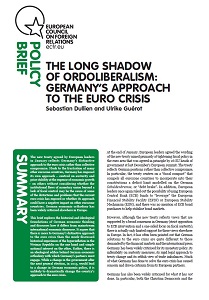THE LONG SHADOW OF ORDOLIBERALISM: GERMANY’S APPROACH TO THE EURO CRISIS
THE LONG SHADOW OF ORDOLIBERALISM: GERMANY’S APPROACH TO THE EURO CRISIS
Author(s): Sebastian Dullien, Ulrike Guerot
Subject(s): National Economy, Government/Political systems, Political economy, Socio-Economic Research
Published by: ECFR European Council on Foreign Relations
Keywords: ordo-liberalism; Walter Eucken; Franz Böhm; Leonhard Miksch; Hans Großmann-Doerth; Euro-zone;
Summary/Abstract: The new treaty agreed by European leaders in January reflects Germany’s distinctive approach to the euro crisis rather than collective compromise. Much to the frustration of many other eurozone count-ries, Germany has imposed its own approach – centred on austerity and price stability at the expense of economic growth – on others without considering whether the institutional flaws of monetary union beyond a lack of fiscal control may be the cause of some of the distortions and problems that the cur-rent euro crisis has exposed or whether its approach could have a negative impact on other eurozone countries. German economic orthodoxy has been widely criticised elsewhere in Europe. // This brief explores the historical and ideological foundations of German economic thinking and discusses how it differs from mainstream international economic discourse. It argues that there is more to Germany’s distinctive approach to the euro crisis than the much-discussed historical experience of the hyperinflati-on in the Weimar Republic on the one hand and simple national interest on the other. Rather, there is an ideological edifice behind German economic orthodoxy with which Germany’s partners must enga-ge. While a change in the government after the next general election, in 2013, would lead to a change in German economic policy, it is unlikely to dramatically change the country’s approach to the euro crisis.
Series: ECFR Policy Briefs
- Page Count: 16
- Publication Year: 2012
- Language: English
- Content File-PDF

